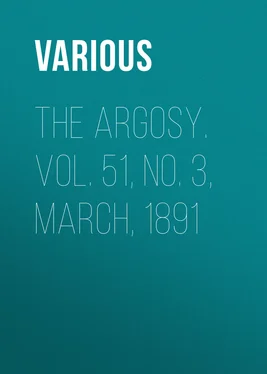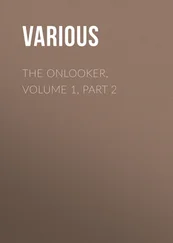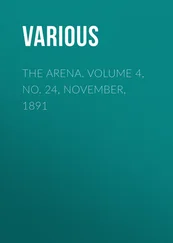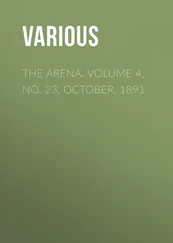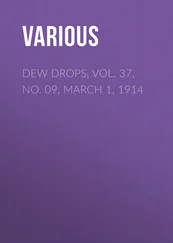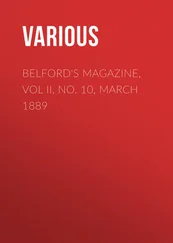Various - The Argosy. Vol. 51, No. 3, March, 1891
Здесь есть возможность читать онлайн «Various - The Argosy. Vol. 51, No. 3, March, 1891» — ознакомительный отрывок электронной книги совершенно бесплатно, а после прочтения отрывка купить полную версию. В некоторых случаях можно слушать аудио, скачать через торрент в формате fb2 и присутствует краткое содержание. Жанр: foreign_antique, periodic, foreign_edu, на английском языке. Описание произведения, (предисловие) а так же отзывы посетителей доступны на портале библиотеки ЛибКат.
- Название:The Argosy. Vol. 51, No. 3, March, 1891
- Автор:
- Жанр:
- Год:неизвестен
- ISBN:нет данных
- Рейтинг книги:4 / 5. Голосов: 1
-
Избранное:Добавить в избранное
- Отзывы:
-
Ваша оценка:
- 80
- 1
- 2
- 3
- 4
- 5
The Argosy. Vol. 51, No. 3, March, 1891: краткое содержание, описание и аннотация
Предлагаем к чтению аннотацию, описание, краткое содержание или предисловие (зависит от того, что написал сам автор книги «The Argosy. Vol. 51, No. 3, March, 1891»). Если вы не нашли необходимую информацию о книге — напишите в комментариях, мы постараемся отыскать её.
The Argosy. Vol. 51, No. 3, March, 1891 — читать онлайн ознакомительный отрывок
Ниже представлен текст книги, разбитый по страницам. Система сохранения места последней прочитанной страницы, позволяет с удобством читать онлайн бесплатно книгу «The Argosy. Vol. 51, No. 3, March, 1891», без необходимости каждый раз заново искать на чём Вы остановились. Поставьте закладку, и сможете в любой момент перейти на страницу, на которой закончили чтение.
Интервал:
Закладка:
5. In every group of three sets of figures the first set represents the page of the book; the second, the number of the line on that page, probably counting from the top; the third the position in ordinary rotation of the word on that line. Thus you have the number of the page, the number of the line, and the number of the word.
6. In the case of the interlined groups of two sets of figures, the first set represents the number of the page; the second set the number of the line, probably counting from the top, of which line the required letter will prove to be the initial one.
7. The words thus spelled out by the interlined groups of double figures are, in all probability, proper names, or other uncommon words not to be found in their entirety in the book on which the cryptogram is based, and consequently requiring to be worked out letter by letter.
8. The book in question is not a dictionary, nor any other work the words of which come in alphabetical rotation. It is probably some ordinary book, which the writer of the cryptogram and the person for whom it is written have agreed upon beforehand to make use of as a key. I have no means of judging whether the book in question is an English or a foreign one, but by it alone, whatever it may be, can the cryptogram be read.
"Now, my dear Ducie, it would be wearisome for me to describe, and equally wearisome for you to read, the processes of reasoning by means of which the above deductions have been arrived at. But in order to satisfy you that my assumptions are not entirely fanciful or destitute of sober sense, I will describe to you, as briefly as may be, the process by means of which I have come to the conclusion that the book used as the basis of the cryptogram was not a dictionary or other work in which the words come in alphabetical rotation; and such a conclusion is very easy of proof.
"In a document so lengthy as the MS. of your friend the Scotch laird there must of necessity be many repetitions of what may be called 'indispensable words'—words one or more of which are used in the composition of almost every long sentence. I allude to such words as a , an , and , as , of , by , the , their , them , these , they , you , I , it , etc. The first thing to do was to analyse the MS. and classify the different groups of figures for the purpose of ascertaining the number of repetitions of any one group. My analysis showed me that these repetitions were surprisingly few. Forty groups were repeated twice, fifteen three times, and nine groups four times. Now, according to my calculation, the MS. contains one thousand two hundred and eighty-three words. Out of those one thousand two hundred and eighty-three words there must have been more than the number of repetitions shown by my analysis, and not of one only, but of several of what I have called 'indispensable words.' Had a dictionary been made use of by the writer of the MS. all such repetitions would have been referred to one particular page, and to one particular line of that page: that is to say, in every case where a word repeated itself in the MS. the same group of numbers would in every case have been its valeur . As the repetitions were so few I could only conclude that some book of an ordinary kind had been made use of, and that the writer of the cryptogram had been sufficiently ingenious not to repeat his numbers very frequently in the case of 'indispensable words,' but had in the majority of cases given a fresh group of numbers at each repetition of such a word. I might, perhaps, go further and say that in the majority of cases where a group of figures is repeated such group refers to some word less frequently used than any of those specified above, and that one group was obliged to do duty on two or more occasions, simply because the writer was unable to find the word more than once in the book on which his cryptogram was based.
"Having once arrived at the conclusion that some book had been used as the basis of the cryptogram, my next supposition that each group of three sets of numbers showed the page of the book, the number of the line from the top, and the position of the required word in that line, seemed at once borne out by an analysis of the figures themselves. Thus, taking the first set of figures in each group, I found that in no case did they run to a higher number than 500, which would seem to indicate that the basis-book was limited to that number of pages. The second set of figures ran to no higher number than 60, which would seem to limit the lines on each page to that number. The third set of figures in no case yielded a higher number than 12, which numerals, according to my theory, would indicate the maximum number of words in each line. Thus you have at once (if such information is of any use to you) a sort of a key to the size of the required volume.
"I think I have now written enough, my dear Ducie, to afford you some idea of the method by means of which my conclusions have been arrived at. If you wish for further details I will supply them—but by word of mouth, an it be all the same to your honour; for this child detests letter-writing, and has taken a vow that if he reach the end of his present pen-and-ink venture in safety, he will never in time to come devote more than two pages of cream note to even the most exacting of friends: the sequitur of which is, that if you want to know more than is here set down you must give the writer a call, when you shall be talked to to your heart's content.
"Your exhausted friend, "Geo. Bexell."Captain Ducie had too great a respect for the knowledge of his friend Bexell in matters like the one under review to dream for one moment of testing the validity of any of his conclusions. He accepted the whole of them as final. Having got the conclusions themselves, he cared nothing as to the processes by which they had been deduced: the details interested him not at all. Consequently he kept out of the way of his friend, being in truth considerably disgusted to find that, so far as he was himself concerned, the affair had ended in a fiasco. He could not look upon it in any other light. It was utterly out of the range of probability that he should ever succeed in ascertaining on what particular book the cryptogram was based, and no other knowledge was now of the slightest avail. He was half inclined to send back the MS. anonymously to Platzoff, as being of no further use to himself; but he was restrained by the thought that there was just a faint chance that the much-desired volume might turn up during his forthcoming visit to Bon Repos—that even at the eleventh hour the key might be found.
He was terribly chagrined to think that the act of genteel petty larceny, by which he had lowered himself more in his own eyes than he would have cared to acknowledge, had been so absolutely barren of results. That portion of his moral anatomy which he would have called his conscience pricked him shrewdly now and again, but such pricks had their origin in the fact of his knavery having been unsuccessful. Had his wrong-doing won for him such a prize as he had fondly hoped to gain by its means, Conscience would have let her rusted spear hang unheeded on the wall, and beyond giving utterance now and then to a faint whisper in the dead of night, would have troubled him not at all.
It was some time in the middle of the night, about a week after Bexell had sent him back the papers, that he awoke suddenly and completely, and there before him, as clearly as though it had been written in letters of fire on the black wall, he saw the title of the wished-for book. It was the book mentioned by Platzoff in his prefatory note: The Confessions of Parthenio the Mystic . The knowledge had come to him like a revelation. How stupid he must have been never to have thought of it before! That night he slept no more.
Читать дальшеИнтервал:
Закладка:
Похожие книги на «The Argosy. Vol. 51, No. 3, March, 1891»
Представляем Вашему вниманию похожие книги на «The Argosy. Vol. 51, No. 3, March, 1891» списком для выбора. Мы отобрали схожую по названию и смыслу литературу в надежде предоставить читателям больше вариантов отыскать новые, интересные, ещё непрочитанные произведения.
Обсуждение, отзывы о книге «The Argosy. Vol. 51, No. 3, March, 1891» и просто собственные мнения читателей. Оставьте ваши комментарии, напишите, что Вы думаете о произведении, его смысле или главных героях. Укажите что конкретно понравилось, а что нет, и почему Вы так считаете.
